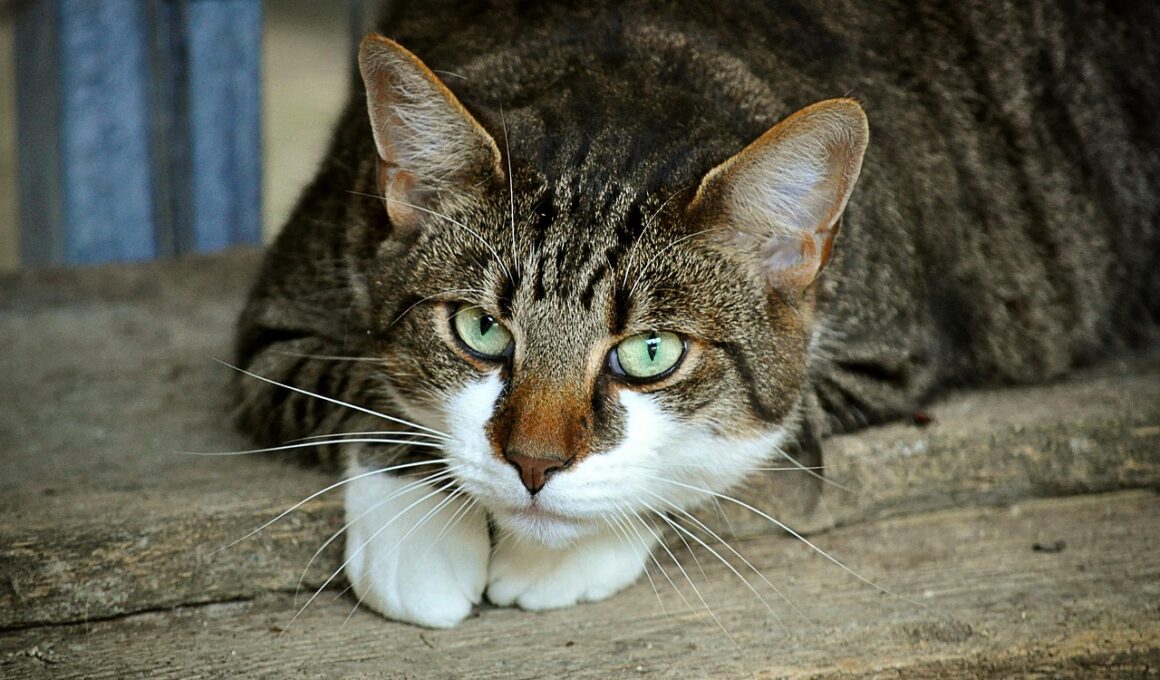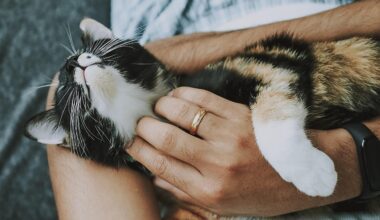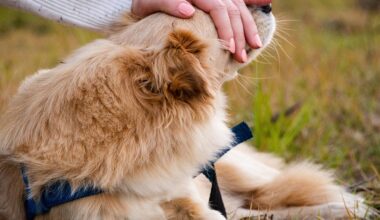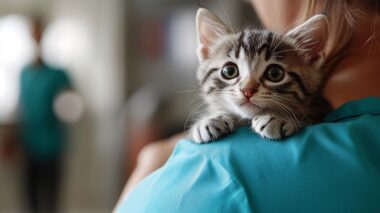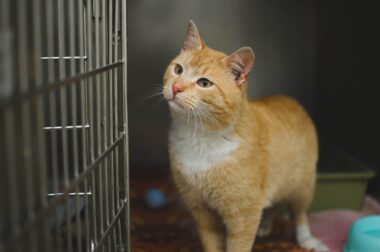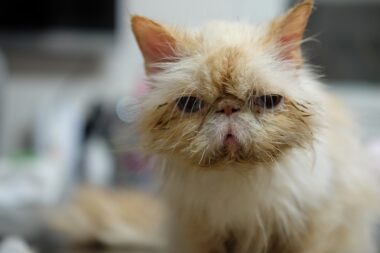The Role of Nutrition Discussion During Cat Vet Visits
Maintaining your cat’s health encompasses various aspects, such as proper nutrition, regular exercise, and preventive care. A significant part of a veterinary visit focuses on nutrition discussions. This helps ensure that your cat receives the best diet possible for optimal health and well-being. Cats have unique dietary requirements, and understanding them improves both their quality of life and longevity. A veterinarian can provide invaluable insights into balancing their diet, including the right proportions of proteins, fats, and carbohydrates. Additionally, consulting your vet about any necessary supplements that support overall health is advisable. Proper nutrition plays a crucial role in maintaining a healthy weight in cats, aiding in preventing prevalent conditions like obesity, diabetes, and kidney problems. Discussing nutritional needs can also prevent food allergies and intolerances that may lead to digestive issues. Regular nutrition consultations allow you to stay updated on dietary products and advancements in pet nutrition, ensuring your cat gets modern and relevant dietary solutions. Preparing for these conversations during veterinary visits enhances your ability to make informed dietary choices for your feline friend.
Before your visit, gathering essential information about your cat’s diet is crucial. Take note of what type of wet or dry food your cat consumes and any treats they may enjoy. Document any previous dietary modifications, including changes in their eating habits or any signs of food sensitivity, like itching or gastrointestinal upset. When you provide detailed information to your veterinarian, it enables them to suggest the most appropriate dietary plan tailored to your cat’s needs. If applicable, you might also track your cat’s weight, activity level, and behavior while eating. Knowing whether your cat is a finicky eater or a free-feeder can guide recommendations. Equally important is to consider your cat’s age, health status, and lifestyle factors that may affect its dietary requirements. Preparing a comprehensive list of questions regarding nutrition is also beneficial, tackling areas of concern, including the best food brands or specific diets for senior cats or those with health conditions. If your veterinarian recommends transitioning your cat to a different diet, ask about the most suitable approach to prevent digestive upset during the change.
Understanding Your Cat’s Nutritional Needs
Understanding your cat’s nutritional needs is vital for their health. Cats are obligate carnivores, meaning their diets primarily consist of meat. Protein is essential for maintaining body functions and healthy muscle development. As a cat owner, you should also be aware that the needs of kittens differ from those of adult or senior cats. Kittens require increased protein for growth, while senior cats may need lower protein levels if kidney function is compromised. Additionally, cats need taurine, an amino acid that supports heart and eye health. Not providing adequate amounts may lead to severe health issues. Discussing these nutrient requirements with your vet helps ensure your cat gets the balanced diet essential for their specific life stage. Moreover, if your pet has health challenges such as obesity or diabetes, nutritional adjustments become imperative. Consulting your vet about specialized dietary formulas tailored for these health issues can significantly improve your cat’s condition. Make significant changes gradually and under the vet’s supervision while monitoring your cat’s overall reaction to new diets and any potential side effects throughout the process.
Hydration is another important aspect of cat nutrition. Cats may disappointingly tend to avoid drinking water as they primarily derive necessary moisture from their food. Therefore, providing a diet that maintains their hydration levels is imperative. High-quality wet foods can help with this, as they typically contain higher moisture content compared to dry kibble. Discuss with your vet about the best options and how to encourage your cat to drink water more frequently, such as offering multiple water bowls or a pet fountain. Good hydration supports renal health and prevents urinary tract diseases impacting many felines. Regular communication with your veterinarian about hydration methods is beneficial to assess your cat’s fluid intake and overall health. A well-hydrated cat leads to improved organ function and urinary flow, reducing the risk of common issues like crystals or stones. It’s essential to observe your cat’s bathroom habits during the transition to a new diet, as any significant changes can indicate underlying problems. Track their weight and note any anomalies, as they provide valuable insights for your vet during visits.
The Importance of Regular Vet Visits
Regular veterinary visits are critical in ensuring your cat’s wellness. These check-ups provide opportunities to routinely discuss nutrition and review dietary changes or concerns that arise. Developing a strong relationship with your vet is vital for better service during visits, fostering open and insightful discussions about your cat’s nutritional needs. During these consultations, alerts for any symptoms indicating nutritional deficiencies or food intolerances can be flagged early. Taking your cat to the veterinarian enables assessments of how effectively their dietary requirements have been met over time. Routine examinations allow detectability of health issues before they escalate, so following a vet’s nutritional recommendations can significantly benefit your cat. These discussions not only enhance your understanding of feline nutrition but also keep you informed of modern, effective strategies than can enrich your pet’s life. Additionally, it fosters a greater awareness of changing nutritional needs due to age or medical conditions. Emphasizing the importance of routine visits helps establish a proactive care routine that prioritizes your cat’s long-term health through proper nutrition and preventive measures.
The human-animal bond plays a substantial role in the topic of feline nutrition. As cat owners, understanding the value of nutrition in a pet’s life fosters more profound commitment towards their overall well-being. Involving family members during your discussions with the vet about diet decisions ensures everyone understands the responsibility of feeding and caring for your cat effectively. This cohesive approach enhances the experience for the pet through healthier diets and prevents fragmentation of information regarding their needs. Consider having your vet evaluate all household cats and their interactions with food. Doing so can help tailor dietary plans for each cat while understanding how one cat may affect another’s food intake or behavior. Additionally, never hesitate to share your progress or any incidents regarding nutrition with your veterinarian, as they provide clarity and expertise on your situation. The appreciation for an integrated approach to your cat’s nutrition improves their health, enhances the relationship within the family unit, and elicits a sense of shared responsibility among all caretakers, ensuring a happier life for both cats and their owners.
Considerations for Special Dietary Needs
Lastly, some cats may have special dietary needs due to health issues. If your cat has been diagnosed with a medical condition, a vet discusses recommended diets suited to manage specific health challenges accordingly. Conditions such as allergies, digestive problems, diabetes, or renal failure necessitate dietary adjustments that only a professional can properly advise. During the veterinary visit, do not hesitate to express any concerns and inquire about suitable dietary alternatives or prescription diets tailored to enhance your cat’s quality of life. Gaining insights into food decomposition, ingredients, and their nutritional value further empowers you during shopping decisions. Investigating these topics allows a better understanding of commercial pet foods and dietary supplements available in the market. It’s vital to address problems promptly, as ignoring potential food-related issues can lead to severe consequences. Ongoing monitoring of your cat’s reaction to specialized diets is necessary, ensuring that you adapt based on how they react physically and emotionally to food changes. Show continuous advocacy for your pet’s needs to ensure they lead healthy, fulfilling lives while decreasing possible complications stemming from inadequate nutrition.
In conclusion, preparing for discussions about nutrition during veterinary visits plays a pivotal role in your cat’s overall health. Understanding their dietary needs, gathering information, and establishing regular communication with your vet are crucial steps. Creating a good relationship with your veterinarian facilitates open and fruitful exchanges about your cat’s nutrition. Prioritizing nutrition as part of routine veterinary care contributes to a longer, happier life for your feline friend. As a responsible pet owner, the knowledge gained from these discussions equips you to make better decisions and advocate for your cat’s well-being. Staying informed about modern research in feline nutrition allows you to adjust diets according to any changes in your pet’s health or needs. Therefore, consider cat veterinary visits as more than just check-ups, but a way to engage in comprehensive care discussions that also include nutrition. Emphasizing the importance of these discussions fosters mutual understanding and advocacy for your cats while preventing potential health issues. Ultimately, implementing the insights gained during these consultations into your daily care further enriches the bond you share with your beloved feline companion.
